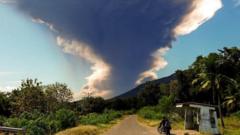Indonesia's Mount Lewotobi Laki-laki is erupting once more, unleashing a massive ash cloud that soared to 18 kilometers (11 miles) into the atmosphere. This latest bout of volcanic activity has prompted residents on the island of Flores to evacuate their homes, though there have been no reports of fatalities as of Monday morning when the volcano reawakened. In response, authorities have elevated the alert status to the highest level after prior eruptions occurred three weeks ago.
On Monday, at least 24 flights heading to and from Bali, the neighboring resort island, were canceled, although some operations resumed the following day. According to Muhammad Wafid, head of the geology agency, the eruption reached its apex when hot clouds were expelled at 11:05 a.m. local time (03:05 GMT), marking the most powerful eruption since November. "An eruption of that size certainly carries a higher potential for danger, including its impact on aviation," Wafid noted to The Associated Press.
The initial eruption, characterized by a loud roar, led to the establishment of an extended exclusion zone measuring 7 kilometers around the central vent. Furthermore, residents were warned about the possibility of lahar floods—mud or debris flows of volcanic material—if heavy rainfall were to occur. The twin-peak volcano erupted again at 7:30 p.m. on the same day, launching ash and lava to heights of 13 kilometers, and a final explosive event took place at 5:53 a.m. Tuesday, albeit with reduced intensity.
Videos captured during the overnight hours depicted streams of glowing lava cascading from the peaks while emergency evacuations unfolded as over 4,000 individuals fled the danger zone, according to local disaster management authorities. Those who opted to remain behind now face dire shortages of essential supplies like water and food. More specifically, there are growing concerns regarding the cleanliness of available water, as thick clouds of volcanic ash have covered the area.
"As the eruption continues with several secondary explosions and ash clouds drifting westward and northward, we must focus our emergency response efforts on the affected communities who have yet to evacuate," remarked Paulus Sony Sang Tukan, the leader of Pululera village situated approximately 8 kilometers from Lewotobi Laki-laki. Indonesia lies along the Pacific "Ring of Fire," a zone of heightened seismic activity prone to volcanic eruptions and earthquakes. Although Lewotobi Laki-laki has experienced several eruptions this year, casualties have yet to be reported, contrasting with a deadly eruption last November that resulted in at least ten fatalities and the displacement of thousands.
As a note, Lewotobi Laki-laki means "man" in Indonesian and stands alongside its taller counterpart, 1,703-meter Perempuan, which translates to "woman." The situation remains fluid as updates pour in from local authorities and eyewitness reports.



















